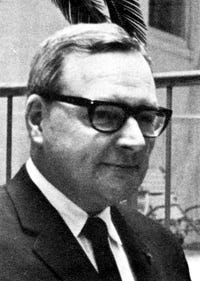Mike Royko 50 Years Ago Today: Mike versus Sheriff Dick Elrod
Weekly Compilation February 28-March 5, 1972
To access other parts of this site, click here for the Home Page
Why do we run this separate item, Mike Royko 50 Years Ago Today? Because Steve Bertolucci, the hero of the serialized novel central to this Substack, “Roseland, Chicago: 1972,” lived in a Daily News household. The Bertolucci’s subscribed to the Daily News, and back then everybody read the paper, even kids. And if you read the Daily News, you read Mike Royko. Read the daily Royko briefing Monday-Friday on Twitter, @RoselandChi1972.
February 28, 1972
Elevator man: Down and out
“Running an elevator isn’t a prestige job, and it paid only $150 a week, but Bruno Peitras felt lucky to have it,” Mike opens today.
“Before a massive heart attack at age 49, he worked for the Crane Co. But the heart attack ended that.”
Bruno works an elevator at the 26th and California Criminal Courthouse. But he just got fired, supposedly because 38 years ago, he got six months probation for a fight in his West Side neighborhood that ended up counting as “robbery” because Bruno pocketed something that an opponent dropped on the ground as he ran away.
For 38 years, Bruno has been married, working, and raising three daughters who are now adults with children of their own.
But according to Sheriff Richard Elrod’s spokesman Tom Leach, who would go on to serve 36 years as spokesman for the Chicago Elections Board, “If a guy lies; if a guy is going to lie about this….Well, you know.”
“No, I don’t know,” Mike writes. “In a tough neighborhood, the brawl sounds like a routine event. I do know that many prominent politicians have far more serious offenses in their backgrounds.”
A former alderman and current top ward boss, writes Mike, “was arrested for armed robbery at about the same age. He beat hell out of an old lady who ran a grocery store. But that didn’t keep him from political success, good cigars, and daily manicures.”
And another alderman bribed a witness in a criminal case.
It's interesting that when Mike mentions things like this, he often leaves out the name, like today. Of course, everyone who mattered knew at the time who Mike was talking about here.
Anyway, Mike thinks the problem is something else, and maybe you can guess:
“The Machine is tolerant of a criminal record. Quite a few Syndicate louts have found steady income on city payrolls. But the Machine seldom forgives the crime of being a Republican. And that may be Bruno’s sin. He was hired when Joseph Woods, a Republican, was sheriff.”
The Shakman decree outlawing firing for political reasons was just finalized in our 1972 timeline, so Mike figures they’re using Bruno’s old arrest as an excuse. If not, “they can prove their sincerity by rehiring Bruno,” Mike concludes.
Here’s the guy who put the Shakman in "Shakman Decree"--and BTW, how does HE not have a statue??
READ WHY WE MUST RIGHT THIS WRONG HERE —
AND SIGN THE PETITION HERE!
February 29, 1972
A Red hater gets a shock
“A scientist friend of mine has a Time Machine and we sometimes take trips,” Mike starts today.
“Yesterday, while drifting backwards in time, we decided to buy a few nostalgic phonograph records, so we stopped in the year 1950.”
They run into a young man who asks them what things are like in 1972. He wants to hear about politics especially.
“To begin with, the President has just returned from a trip to China,” Mike tells him.
The young man is happy that Chiang Kai-shek finally beat the communists, and puzzled when Mike says no, he lost.
“Then what is the President doing there?”
“Oh, eating, drinking, seeing the sights, talking to the leaders….He drank a toast to China…As a matter of fact, he even quoted from the Little Red Book of wise sayings of Mao Tse-tung in his toast.”
Mike and his scientist friend have to revive the poor 1950 man, and later wrap him in blankets and take other steps to help with shock.
Mike tells the young man that president and the Chinese exchanged gifts.
“‘What did they give us?’ he said.
“‘Two pandas.’
… “‘And what did we give them?’
“‘Two musk oxen and Taiwan.’
“‘Taiwan?’ he gasped.
“‘Possibly. We said we’d take our troops out and sort of said we’d mind our own business.’”
The 1950 man cries that everything he’s done for his entire life is wasted: “My entire career--all aimed at saving our country from internal and external Commies--a waste.”
But Mike tells him he’ll be very big on the 1972 political scene. “In fact, when we left you were considered the heavy favorite in the presidential election.”
“He sprang to his feet and pumped our hands, while shouting, ‘Then all is not lost for our nation.’
“And he had both his arms in the air, making V’s with his fingers.”
March 1, 1972
Elrod’s act of kindness
Remember Bruno Peitras, the elevator operator at the 26th and California Criminal Courts Building who got fired by Sheriff Elrod because he supposedly robbed somebody 38 years ago and got six months probation?
And Bruno is a Republican. Mike wrote about Bruno on Monday, and said if Elrod really didn’t fire Bruno for being a Republican, he should prove it by hiring him back.
Now, Mike writes, “in fairness--I must describe a touching kindness on Elrod’s part. I have discovered that he used his political pull to get a very good city job for another elderly man. And by a weird coincidence, this man also got in trouble with the law about 38 years ago.”
Despite his criminal record, Elrod got this old man a job for the Model Cities program. He’s making about $220 a week--that’s $1485/week in 2022 money, or $71,280/year. His name is Sam Elrod, and he’s the sheriff’s uncle.
Uncle Sam was caught stealing votes at a 24th Ward polling place, and fined. Previously, his brother was on the County Board and got him a job back then as “picnic grove inspector” for the forest preserves.
Oh, and Mike notes that Uncle Max Elrod now has a job in the office of the Cook County Recorder of Deeds, even though he works full time at a clothing store right across the street from City Hall, in the Sherman House Hotel.

March 2, 1972
What happened to the crisis?
“We had a welfare crisis last fall and it was really exciting, with lots of big headlines, predictions of terrible hunger and suffering, and an abundance of cries of outrage,” Mike remembers.
“The villain in this drama was Gov. Richard B. Ogilvie,” he recounts, because Ogilvie set a deadline for reducing payments to General Assistance welfare recipients. “There were days when Ogilvie was presented as almost an ogre who gleefully peels ADC babies and slices them into his breakfast cereal.”
Mike wrote at the time that Ogilvie wasn’t trying to throw people off welfare—that Ogilvie had asked Cook County two years earlier to transfer people on General Assistance to other welfare categories, because the federal government paid 50% of the tab in all other categories. Ogilvie’s analysis was that almost everybody could fit into one of those federally-funded categories. Cook County didn’t fill out the paper work for those transfers, though the state stood to save $50 million per year.
“I was bombarded by protests from case workers and welfare administrators,” writes Mike. “Most of them said the same thing: Nonsense, almost everybody drawing General Assistance payments wouldn’t qualify for the other, federally funded categories. That’s what they said. But they tried harder (to transfer GA recipients to other categories).”
“Now that the furor has subsided, we can take a look at some of the results. Up to October, when Ogilvie applied the pressure, the state was spending about $9.6 million a month for General Assistance. Last month, the GA payments had dropped to $5.3 million.”
“This doesn’t mean that needy people stopped receiving help. They’re getting the same amount, but now half of it is paid by the federal government.”
March 3, 1972
A matter of no little interest
“Try to picture about 800 small Chicago-style bungalows. Now that is a lot of bungalows.”
Mike takes a question of public money and brings it right down to the elemental building block of Chicago, the bungalow.
Those 800 bungalows would line 20 city blocks, he writes, full of a lot of hard-working people who don’t have a lot of money. That many bungalows would generate about $400,000 per year in real estate taxes.
And Cook County blows off about $400,000 every year by putting its money in “politically connected banks without drawing interest”.
“So why is Bert Korzen, our county treasurer, so generous to the banks? Can it be that Korzen doesn’t know they pay interest? I can’t believe that, since Korzen is a Polish-American and they are known to be prudent nickel-biters.”
Mike is Polish himself, but he seldom mentions that.
“A more likely answer can be found in the names of some of the banks’ stockholders and board members. It reads like the speaker’s platform at a Machine banquet.”
Michael Daley. George Dunne. Parky Cullerton’s pal and nephew. Ald. Edwin Fifielski. Ald. Tom Keane, “who has dollar signs for eyes”. Tom Keane’s wife and brother. A County Board commissioner.
Mike ends with a rousing call to action:
“I publicly call upon the square-jawed and idealistic Edward V. Hanrahan, the battling state’s attorney, to investigate,” writes Mike. Hanrahan could bring the whole thing to a grand jury.
“Mr. Hanrahan, you owe it to those 800 bungalow owners. Launch your big game safari. Or are you only a rabbit hunter at heart?”
Don’t miss Chapter 3 Notes Part B:
Chicago Newspapers Circa 1972
March 4-5, 1972
As we here all know, weekends could be sad for a Daily News family because Mike Royko wasn’t in the Daily News’ single weekend edition. So we look for Mike elsewhere on weekends.
Sorry, no weekend edition this week—I’ll try to sneak something in here at a later date.
Only two weeks before Chapter 4: The Gately’s Doughnut drops—and your chance to win some cool 1972 stuff is over. Check out the full prize list here.
By the way, this feature is no substitute for reading Mike’s full columns. He’s best appreciated in the clear, concise, unbroken original version. Mike already trimmed the verbal fat, so he doesn’t need to be summarized Reader’s Digest-style, either. Our purpose here is to give you some good quotes from the original columns, but especially to give the historic and pop culture context that Mike’s original readers brought to his work. You can’t get the inside jokes if you don’t know the references. Plus, many columns didn’t make it into the collections, so unless you dive into microfilm, there are some columns covered here you will never read elsewhere. If you don’t own any of Mike’s books, consider buying his first column collections to start off, “Up Against It” and “I May Be Wrong, BUT I DOUBT IT.”
Do you dig spending some time in 1972? If you came to MIKE ROYKO 50 YEARS AGO TODAY from social media, you may not know it’s part of the book being serialized here, one chapter per month: “Roseland, Chicago: 1972.” It’s the story of Steve Bertolucci, 10-year-old Roselander in 1972, and what becomes of him. Check it out here.
To get the weekly compilation of MIKE ROYKO 50 YEARS AGO TODAY in your mailbox along with THIS CRAZY DAY IN 1972 and new chapters of the book, SUBSCRIBE FOR FREE!














